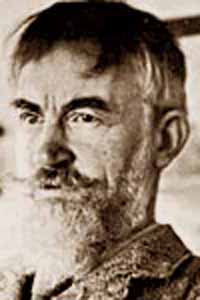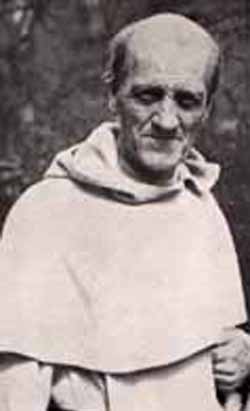 |
Socio-Political Issues
Evaluating the Distributist League
Patrick Odou
The following quotes are from a three-page letter written in the early 1950’s by Patrick Cahill, who was the secretary of the Distributist League in England back in 1931. Cahill wrote this letter at the request of a Fr. Ferdinand Valentine. He was compiling information for a book published in 1955 on the life of Fr. Vincent McNabb, who died in 1943.
Fr. McNabb, an Irish Dominican, was one of the leaders of Distributism in the early 20th century. The letter concerns an event that took place in September 1931: an encounter between Fr. Vincent McNabb and George Bernard Shaw at one of McNabb’s public speeches.
Shaw, as is well known, was an ardent socialist and a member of the Fabian Society.
I take from this letter some information concerning the Distributist League’s spokesmen, foundation, objectives, structure and organization. Cahill writes:

The Socialist Shaw, above, was invited to attend Fr. McNabb's talk |
In September 1931 the Secretary of the Central Branch of the Distributist League addressed the postcard quoted above [an invitation to attend McNabb’s speech] to George Bernard Shaw who was then at the height of his publicity. But before trying to recollect the results … I should first say briefly what the League was, for Fr. McNabb was one of its best-known spokesmen. Others, were G. K. Chesterton, Hilaire Belloc (its successive presidents) and Eric Gill.
The League owed its foundation, on September 17, 1926, to those readers of G.K.’s Weekly [G. K. Chesterton] who wished to associate in support of the paper and its policies. The objects of the League may be defined as:
- To convince a large number of people that, in order to restore liberty, property must be distributed;
- To find out how property could be distributed;
- To distribute it.
Its organization consisted of some dozen or more local and independent branches loosely associated under a national Council and Secretary. … As [London Central] Branch Secretary at the time, dissatisfied perhaps with progress towards these objects, I thought it desirable to get a clear statement on the aim of the League, and invited Fr. Vincent to speak to us and the world on Human Liberty” (1).
Let me analyze some curiosities of this document.
First, Cahill tells us in the opening paragraph that Fr. McNabb, Chesterton, Belloc, and Eric Gill were considered the “best-known spokesmen” of the League. So, those who play the Distributist Shell Game and say that McNabb and Gill were not representatives of Distributism and, therefore, should not be analyzed as such – as I have done [here and here] – are in disagreement with the well informed ex-secretary of the Distributist League.
Second, the three objectives of the League written above couldn’t be more generic. However, in the context the letter was written regarding the encounter between McNabb with Shaw, we can easily understand them in a socialist or communist perspective. When we consider that Socialism and Communism also strive for a common distribution of property, we see that those same goals could well be part of the platform of any Socialist or Communist party.
Objectives 1 and 2 seek to convince as many people as possible that property must be distributed even though the how of this distribution has not been determined. One can see how these three objectives would serve the Socialist/Communist Revolution, especially in wake of the Russian Communist Revolution. As a matter of fact, the Distributist plan for property was/is in many ways similar to Lenin’s New Economic Policy that had been applied in Russia until some years before the foundation of the League. In short, Lenin’s policy distributed some property to the people and applied some capitalist methods.
The first two objectives are in the realm of ideas and methods while the third objective calls for direct action – to actually distribute property.

Cahill identifies Fr. McNabb, above, as "one of the League's best known spokesmen." |
Concerning this third objective, more questions arise. Did the League envision itself someday as becoming an agency or committee actively distributing property? Would it be per chance something like a Committee for Public Safety? I believe the question is not unfounded given that Hilaire Belloc, who many say is the founder of Distributism, was a radical admirer of the French Revolution.
Third, Cahill manifests himself as “dissatisfied” about the establishment of the League’s objectives. Even after years of the League’s existence, it still lacked a clear statement about its aims.
Since the Distributist League had closed by 1940 with the beginning of World War II in Europe, and in this letter written in the early 1950s Cahill was still expressing that dissatisfaction, I am inclined to think that it never clearly defined its aims. There would seem to be no defining statement telling which path Distributism would walk: the Socialist-Communist one or the Catholic one.
This being so, I would appreciate knowing if since that time, any new document by the original founders has surfaced that invalidates Cahill’s opinion. Further, after 1950 was there a reestablishment of the League that I’m not aware of? Was there any later meeting that raised up its fallen banners and made them soar again? In such eventuality, which path did the new leaders of Distributism decide to follow in the application of those goals? I would be pleased to be informed of the answers to these questions, because even though I have been reading about this topic for years, I still haven’t found crystal clear answers to these questions.
Now, if nothing new was added to the picture, how can present-day distributists pretend that those first founders were following or promoting a Catholic economic system? What leads them to say that the objectives of the original distributists were Catholic - and not Socialist or Communist - when such aims were unknown even to an insider such as Cahill?
Fourth, perhaps the most important point demonstrated by the above quote is that, contrary to what distributists try to make Catholics believe, there is absolutely nothing Catholic in those objectives of the League. Catholic Social Doctrine, Catholic morality, Christian Civilization, social and economic harmonious inequality, the necessary promotion of Catholic virtues for an upright social order, etc., are not even mentioned in these objectives enunciated by the ex-secretary of the Distributist League.
These are some initial points I would like to record in this analysis, which I plan to continue soon.
1. Patrick Cahill, apud Ferdinand Valentine, Father Vincent McNabb - The Portrait of a Great Dominican, London: Burns & Oates, 1955, p. 283.

Posted May 18, 2009

Related Topics of Interest
 Belloc the Liberal I - His Support of the French Revolution Belloc the Liberal I - His Support of the French Revolution
 Belloc the Liberal II - His Enthusiasm for Rousseau Belloc the Liberal II - His Enthusiasm for Rousseau
 Belloc the Liberal III - Justifying the Terror Belloc the Liberal III - Justifying the Terror
 St. Thomas against Distributism St. Thomas against Distributism
 Distributists Misleading Their Audience about Capitalism Distributists Misleading Their Audience about Capitalism
 A Distributist Manifesto Spiced with Communism A Distributist Manifesto Spiced with Communism
 Socialism and Distributism in Catholic Clothing Socialism and Distributism in Catholic Clothing
 Eric Gill, a Precursor of Vatican II Eric Gill, a Precursor of Vatican II
 Eric Gill: the Pedophile Founder of Distributism Eric Gill: the Pedophile Founder of Distributism
 Other Moral Pearls of Eric Gill Other Moral Pearls of Eric Gill

Related Works of Interest
|
|
Social-Political | Hot Topics | Home | Books | CDs | Search | Contact Us | Donate

© 2002- Tradition in Action, Inc. All Rights
Reserved
|
 |
|